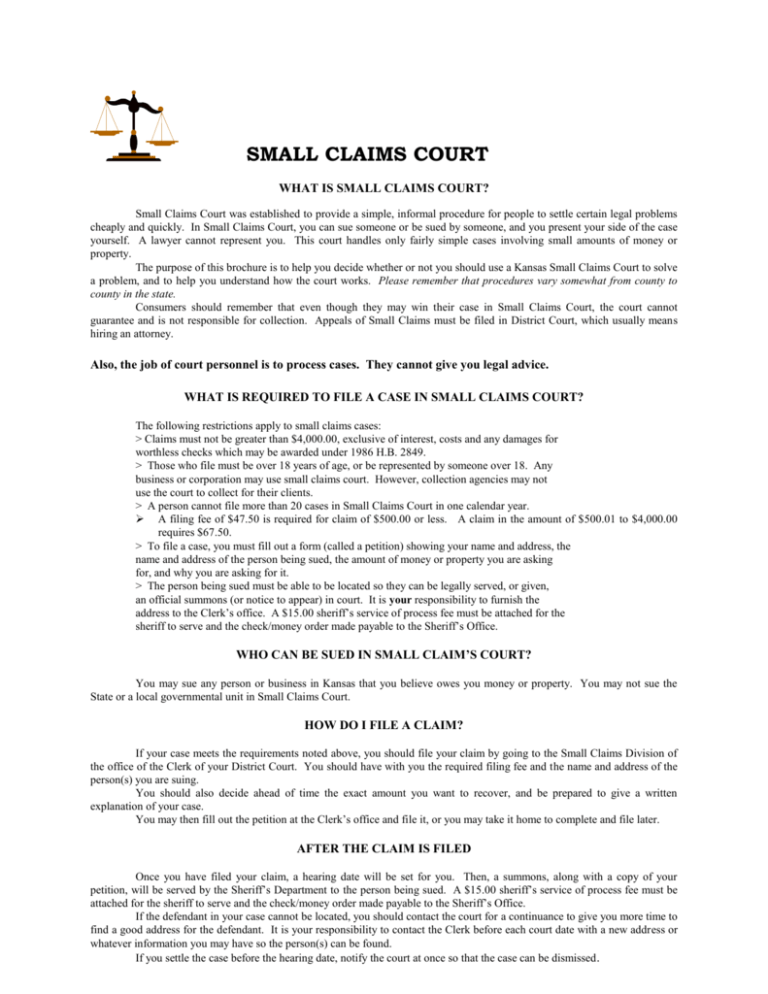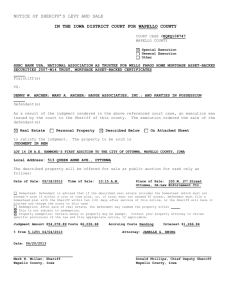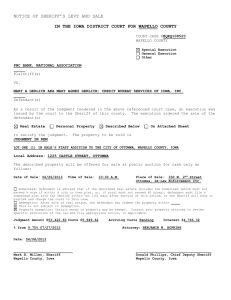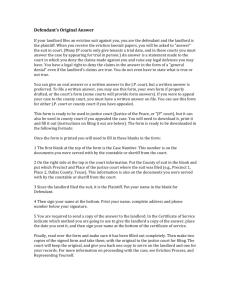SMALL CLAIMS COURT
advertisement

SMALL CLAIMS COURT WHAT IS SMALL CLAIMS COURT? Small Claims Court was established to provide a simple, informal procedure for people to settle certain legal problems cheaply and quickly. In Small Claims Court, you can sue someone or be sued by someone, and you present your side of the case yourself. A lawyer cannot represent you. This court handles only fairly simple cases involving small amounts of money or property. The purpose of this brochure is to help you decide whether or not you should use a Kansas Small Claims Court to solve a problem, and to help you understand how the court works. Please remember that procedures vary somewhat from county to county in the state. Consumers should remember that even though they may win their case in Small Claims Court, the court cannot guarantee and is not responsible for collection. Appeals of Small Claims must be filed in District Court, which usually means hiring an attorney. Also, the job of court personnel is to process cases. They cannot give you legal advice. WHAT IS REQUIRED TO FILE A CASE IN SMALL CLAIMS COURT? The following restrictions apply to small claims cases: > Claims must not be greater than $4,000.00, exclusive of interest, costs and any damages for worthless checks which may be awarded under 1986 H.B. 2849. > Those who file must be over 18 years of age, or be represented by someone over 18. Any business or corporation may use small claims court. However, collection agencies may not use the court to collect for their clients. > A person cannot file more than 20 cases in Small Claims Court in one calendar year. A filing fee of $47.50 is required for claim of $500.00 or less. A claim in the amount of $500.01 to $4,000.00 requires $67.50. > To file a case, you must fill out a form (called a petition) showing your name and address, the name and address of the person being sued, the amount of money or property you are asking for, and why you are asking for it. > The person being sued must be able to be located so they can be legally served, or given, an official summons (or notice to appear) in court. It is your responsibility to furnish the address to the Clerk’s office. A $15.00 sheriff’s service of process fee must be attached for the sheriff to serve and the check/money order made payable to the Sheriff’s Office. WHO CAN BE SUED IN SMALL CLAIM’S COURT? You may sue any person or business in Kansas that you believe owes you money or property. You may not sue the State or a local governmental unit in Small Claims Court. HOW DO I FILE A CLAIM? If your case meets the requirements noted above, you should file your claim by going to the Small Claims Division of the office of the Clerk of your District Court. You should have with you the required filing fee and the name and address of the person(s) you are suing. You should also decide ahead of time the exact amount you want to recover, and be prepared to give a written explanation of your case. You may then fill out the petition at the Clerk’s office and file it, or you may take it home to complete and file later. AFTER THE CLAIM IS FILED Once you have filed your claim, a hearing date will be set for you. Then, a summons, along with a copy of your petition, will be served by the Sheriff’s Department to the person being sued. A $15.00 sheriff’s service of process fee must be attached for the sheriff to serve and the check/money order made payable to the Sheriff’s Office. If the defendant in your case cannot be located, you should contact the court for a continuance to give you more time to find a good address for the defendant. It is your responsibility to contact the Clerk before each court date with a new address or whatever information you may have so the person(s) can be found. If you settle the case before the hearing date, notify the court at once so that the case can be dismissed . YOUR DAY IN COURT Small Claims Court proceedings are conducted informally by the judge. You should be prepared when you arrive for your hearing to clearly explain your side of the case. Bring whatever evidence, papers, documents or other material you need to prove or support your case. You may subpoena witnesses, and you or the judge may question them about the case. A witness fee must be paid to subpoena a witness who is unwilling to appear. A $15.00 sheriff’s service of process fee must be attached for the sheriff to serve and the check/money order made payable to the Sheriff’s Office. The defendant, will, of course, also be allowed to present their side of the case to the judge. If the defendant has filed a counterclaim against you, that may be heard at the same time. Depending on the circumstances, the judge may either make a decision immediately after hearing both sides, or may continue the case to another date. If the defendant was served and does not show up for the hearing, the judge may declare the defendant in default and award judgment to the plaintiff. Once the judge has announced a decision in the case, the Small Claims procedure is over. It is up to you to collect what is owed you if you win. If you lose, an appeal may be filed in District Court. Appeals do cost more money, since they involve payment for another filing fee, legal advise from an attorney, etc. HOW TO APPEAL A CASE Following the judgment, both parties have the right to appeal and get a new hearing from a new judge. Appeals must be filed in writing within 14 days. The filing fee to file an appeal is $195.00. WHAT IF YOU ARE BEING SUED IN SMALL CLAIMS COURT? If you are being sued in small claims court, and you do owe the other party money or property, pay what you owe and you will not have to appear in court. Be sure the court is notified in writing of such a settlement. If you have a claim against the plaintiff (the party suing you) in connection with the same matter that his claim concerns, you may file a counterclaim. Fill out the “Defendant’s Claim” form that came with the summons and return it as soon as possible to the court where the hearing is to take place. If you do not settle the claim against you out of court, then you must appear in court at the time scheduled or the judge can rule against you. Bring with you any papers that will support your side of the dispute and any witnesses who can speak on your behalf. (You too may have a witness subpoenaed for a fee.) The judge will give both you and the other party a chance to speak before he makes his decision. If the judge decides against you, you are legally bound to pay the plaintiff whatever the judge orders you to pay. You may appeal the judge’s decision. Detailed information about the small claims procedure appears on the printed forms you must use to file your case. If you decide to use the small claims procedure you may obtain forms from the District Court. SMALL CLAIMS VENUE K.S.A. 61-3402 states that, “An action against a resident of this state, other than an action for which venue is otherwise specifically prescribed by law, may be brought in the county in which: (a) The defendant resides; (b) the plaintiff resides if the defendant is served therein; (c) the cause of action arose; (d) the defendant has a place of business or of employment if the defendant is served therein; (e) the estate of a deceased person is being probated if such deceased person was jointly liable with the defendant and a demand to enforce such liability has been duly exhibited in the probate proceedings of such decedent's estate; or (f) there is located tangible personal property which is the subject of an action for the possession thereof if immediate possession is sought in accordance with K.S.A. 61-3701, and amendments thereto, at the time of the filing of the action. History: L. 2000, ch. 161, § 38; Jan. 1, 2001. K.S.A. 61-2708 (Small Claims Venue) states that, “The venue of actions commenced under this act shall be as prescribed in article 19 of chapter 61 of the Kansas Statutes Annotated, except that the county in which the cause of action arose shall be proper venue only where it is affirmatively shown that the defendant was a resident of the county where the cause of action arose at the time the cause of action arose.”

![[2015] IECLA 4 - Flogas Ireland Ltd. v Langan Fuels Ltd](http://s3.studylib.net/store/data/007455232_1-06390b3b22fbc86e0883c510933e8a58-300x300.png)





